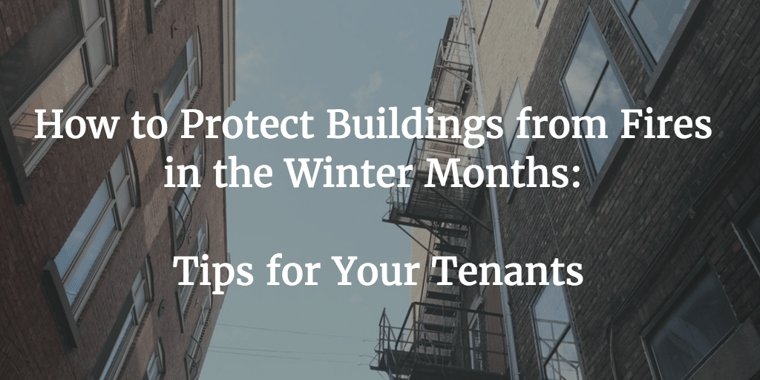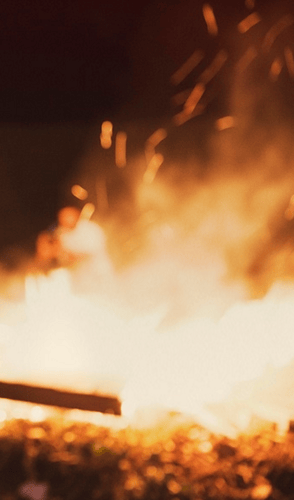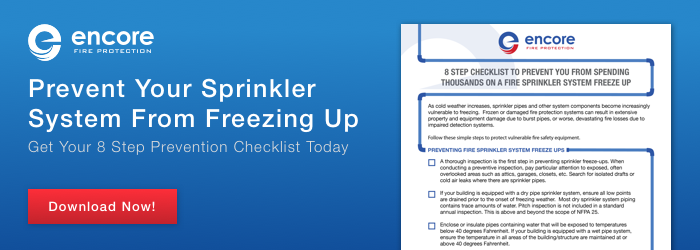Both residential and commercial buildings are at an increased risk of fires in the freezing winter months. We took a look at the most common fire hazards in buildings, and created a comprehensive list of how you and your tenants can prevent fires on your properties.
Whether you're a property manager, facilities manager, or building owner, it's important to know the steps to take for preventing dangerous and costly fires. It's not a bad idea to pass these tips for tenants along to your building residents and users as well!

Preventing a Nightmare Fire in Your Building
There are many seemingly harmless scenarios and habits that can turn a cold winter's night into a life threatening fire. Part of keeping the building safe is your responsibility, but another big piece is the people living in or using the space. Below are tips to ensure your assets and tenants are protected:
Extension Cord Overload
In the freezing months, we're often using a lot of electronics since we're spending more time indoors. Too many things plugged in to one extension cord can be dangerous. This is especially true for any extension cords or outlets in the kitchen that are close to appliances or other heat sources.
Stop Cooking Fires Before They Happen
The NFPA reports that fires involving cooking equipment account for about 45% of home fires. The outcome of these fires results in $1.1 billion in property damage and 430 civilian deaths every year. And as we know, fires in the winter months are scarily common.
To prevent your building from becoming part of those statistics, remind your tenants to:
- Never leave cooking equipment unattended - This might sound obvious, but I'm sure all of us can remember a time when we put something in the oven or were cooking on the stove and got distracted in another room. It's no surprise that leaving equipment unattended in the kitchen is the number one cause of residential fires.
Remind tenants to turn off the oven or stove top if they have to leave the kitchen. Even if they plan on being in the room while their food is cooking, it's always a good idea to set a timer.
- Clean cooking equipment regularly - Grease and food particle build up in or on the surface of cooking equipment can catch fire. Ask tenants to keep cooking areas safe and clean by wiping down any scraps and grease.
- Keep flammable material away from heat sources - This includes loose fitting clothing, plastic and paper packaging, potholders, towels, etc.
- Check cooking appliances before going to sleep - Remind your tenants to check that cooking appliances are shut off before they retire for the night or leaving the building.
- Never smoke inside - Smoking inside is a great way to set off fire alarms and light the building on fire (not to mention that it disturbs other tenants and the chemicals can cling to walls and other surfaces). Kindly remind tenants that there is absolutely no smoking inside the building. Period.
Space Heaters Are Probably Not Worth It
The best way to avoid a building fire from a space heater is to ban them. These effective but dangerous devices are responsible for a third of home heating fires annually, and cause 80% of deaths related to home heating fires.
If your tenants are allowed to use space heaters, be sure that space heaters are turned off before going to sleep. They should also be kept at least three feet away from other furniture and flammable materials. Pets and children should be kept away from space heaters as well.
An obvious tip that still might be good to remind your tenants about is to never use the oven to heat t he house. It's necessary to keep warm in the cold months, but some methods are safer than others.
he house. It's necessary to keep warm in the cold months, but some methods are safer than others.
Other Common Flammable Risks
It's easy for tenants to overlook potential dangers because your building is home to them, so they feel safe and secure. There are, however, countless fire risks lurking. Any flammable materials need to be kept away from heat sources - this includes radiators, space heaters, cooking equipment, and anything else that can heat up.
Candles are a big risk to touch on too - Similar to cooking appliances, they're easy to light and forget about. Tenants need to blow out any candles before going to bed, leaving the building, or exiting the room.
Have an Escape Plan in Place
Maybe this sounds extreme, but having a fire escape plan can be the difference between life or death for your tenants and other building users. A fire sprinkler system can help extinguish flames, but most fire related deaths are actually from smoke inhalation as opposed to burns.
The NFPA provides guidelines to help tenants put together a fire escape plan. It's important that everyone is aware of how to get out of the building in the event of a fire and where to meet once they have escaped.
A diagram illustrating the fire escape plan in place for your building can help residents visualize it better, but nothing is more effective than practice! Every quarter or so, organize a fire drill where tenants run through the fire escape plan.
Test Fire Protection Equipment
It's important for your tenants to do what they can to prevent building fires, but don't forget about your responsibilities too. One of the most important precautions for property and facility managers and owners is testing the fire protection equipment. You might have the proper fire sprinkler systems, fire extinguishers, smoke, and carbon monoxide detectors installed, but that doesn't mean they will work in the event of an emergency. These fire systems must be regularly tested and inspected.
Fire Sprinkler Systems - In the winter, it's especially important to check in on the fire sprinkler system because the pipes are at risk of freezing. This could cost you thousands in damage, and even worse, your system might not work if there is a fire. Get your sprinkler system tested by a local fire protection company, and run through this checklist to prevent freeze ups.
Fire Extinguishers - Make sure you're checking fire extinguishers every 30 days to ensure that the gauge is pointing to the green area. This isn't just a recommendation or best practice, it's required under NFPA 10. Not sure if your fire extinguishers are still good? Get the facts here.
Smoke Detectors - In a fire, every second counts. Smoke alarms should be installed in every bedroom, outside sleeping areas, and on every level of the building. Proper testing of fire alarm systems can save dollars and lives.
Hopefully you found these tips on keeping your buildings and properties safe in the freezing months helpful. Be sure to pass these tips on to your tenants so that they can stay safe for the remainder of the winter!

